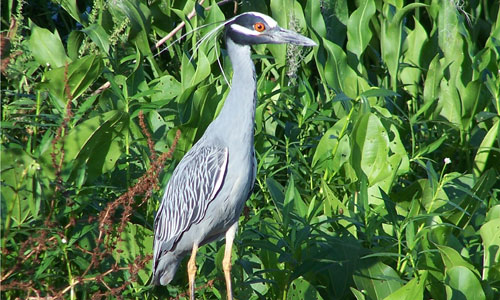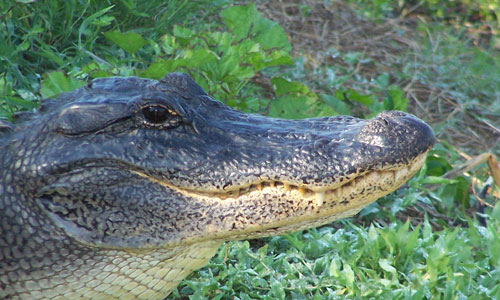Featured Park
A Natural Oasis Near Houston - Brazos Bend State Park

Brazos Bend's wealth of natural resources including wetlands, woodlands and prairies combine to make the park one of the crown jewels of the Texas State Park system. Brazos Bend is a 5,000 acre natural wonder with the right combination of family-friendly picnic and playground facilities, trails, nature center (open daily), banquet hall, pavilions and campgrounds to make the park a great place to spend the day, week or weekend.
“There just aren’t too many places in Texas anymore where you can go and see a multitude of native wildlife in a natural setting,” says Steve Killian, manager of Brazos Bend State Park” “It is exciting to drive through the park and see herds of white-tailed deer forging on tender green leaves or walking a trail around one of our lakes and viewing large American alligators basking in the morning sun. It is a treat for all ages. I have had the good fortune of managing the park for six years and I still am excited and amazed by the diversity of wildlife especially the large alligators that can be seen.”
That excitement, thankfully, doesn’t translate into danger. Alligators are by nature wary of humans and will go out of their way to avoid them. Killian says the park has never had a gator-human attack. He cites a simple rule termed Alligator Etiquette: “The basics of the rules are don’t get within 30’ of gators and leave them alone. I like to tell people the most dangerous part of their visit to Brazos Bend State Park is the drive getting here,” Killian says.
Brazos Bend State Park boasts an active volunteer corps (we are always looking for interested individuals to volunteer) and knowledgeable park rangers who regularly patrol the park’s six lakes, walking the trails during peak times to talk to visitors about gators and nature and answer questions. The park also has one of the most active, viable interpretive programs in the state park system, offering three to six nature programs on Saturdays and Sundays, not only on alligators, but such topics as beginning birding, snakes and birds of prey.
The park boasts a well-maintained trail system that winds for more than 35 miles through the natural wonders of the park. It is easy to immerse yourself in nature at Brazos Bend.
Wildlife biologists estimate that up to 300 American alligators more than six feet in length live in the park, whose eastern boundary fronts 3.2 miles of the Brazos River. Smaller gators – from hatchlings to small adults – are too numerous to count. Some members of the ancient reptilian species, if they survive in the wild until adulthood can live 40 or 50 years.

Nearby stands a sturdy, three-story observation tower that affords a remarkable bird’s eye view of 400 acres of wetlands that stretches to the distant tree line. Great white herons and other wading birds perch among the Southern wild rice stalks. Bald eagles are sometimes seen from the tower that can only be reached by foot or bicycle.
Brazos Bend State Park benefits from a wealth of wildlife, attracted to a mix of habitats in this biological crossroads known as the “Brazos Bottomlands.” Here, tall grass coastal prairies mix with live oak woodlands and bottomland hardwood forests of pecan, burr oak, water oak, live oak and elm. Creeks and riverbanks support dense stands of sycamore, black willow and cottonwoods. This diverse ecological community is home to over 300 species of birds, 500 plant species, 21 species of reptiles and amphibians, 38 species of dragonflies, and 23 species of mammals, including white-tailed deer, raccoon, gray fox, feral hog, bobcat, rabbits and squirrels. There have even been recent cougar sightings.
To educate visitors about the myriad plants and animals found in the park, interpretive panels have been placed generously along the trails. The park’s nature center contains live gator hatchlings and indigenous snakes, as well as an interesting and entertaining “Habitats and Niches” exhibit with interactive displays and open-captioned orientation video.
Don’t miss the half-mile Creekfield Lake Nature Trail. The innovative, paved interpretive trail was designed specifically to make the outdoors and park’s natural resources more accessible to individuals with disabilities. The trail includes nine interpretive panels with tactile bronzes of such wetland wildlife as armadillos, an accessible boardwalk, wildlife observation deck, benches and shaded rest areas.
Campers are advised to reserve well in advance the limited number of $20 water-electric campsites – 77 in all located in the Red Buckeye and Burr Oak camping loops. Each campground has a restroom with showers. Tucked between the two are 14 screened shelters renting for $25 a night. In addition, the park as 20 primitive equestrian campsites as well as 15 reservable primitive tent sites and 18 overflow campsites. Reservations can be made by calling 512-389-8900.
The George Observatory, which is open on Saturdays, opens a pathway to the stars. Operated by the Houston Museum of Natural Science and located within the park, the observatory features three domed telescopes and the Challenger Learning Center.
The telescopes carry observatory staff and visitors on journeys across the night sky where faint echoes of stellar history unfold. Here, the stories told by the stars become the pages of our knowledge about the universe. Meanwhile, the Challenger Learning Center calls upon young people to work together to solve problems of space travel. Teamwork and science skills guide participants to success.
Brazos Bend State Park is one of 93 state parks that make up the Texas State Park System. It is located near Needville about 45 miles southwest of downtown Houston. For more information, call the park at (979) 553-5101. To learn about all of the Texas state parks visit the Texas Parks and Wildlife Web site: www.texasstateparks.org or www.BrazosBend.org.
 Texas Parks and Wildlife Department, 4200 Smith School Road, Austin, TX 78744
Texas Parks and Wildlife Department, 4200 Smith School Road, Austin, TX 78744


